California Law on AI Blog Content: Is It Legal to Use?
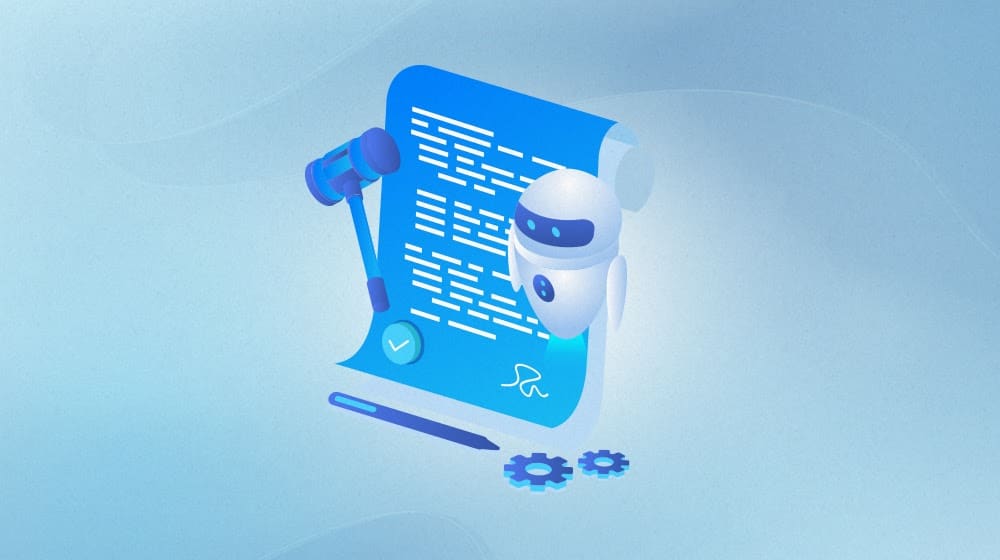
California is often the national leader in legislation when it comes to new technologies and the "move fast and break [regulations]" school of innovation. The state government isn't always right in its initial decisions, and of course, with any political body, there's plenty of fighting over every piece of legislation passed or not passed throughout the state. What perspective they take is often going to be reflected throughout many other state governments in the years to come, can shape the direction of industries, and has far-reaching consequences.
Whether or not you like the choices they make isn't the point of today's article. I'm not going to get political, just practical.
Today, I'm going to try to run down California's recent slate of AI-focused legislation. Buckle up because there's a lot going on.
 30 Second Summary
30 Second Summary
You'll want to pay attention to California's 18 new AI bills, since they often set trends for other states. While most bills focus on specific areas like political ads, healthcare, and education two important points matter for your business. You'll need to watch for growing requirements to disclose AI use in content. You should also prepare for upcoming AI detection tools and watermarks, which has to be available by January 2026. Right now, you can still use AI for your blog content legally as long as you're not using it for anything criminal.
First, a Disclaimer
Before we get started, I need to make a couple of disclaimers.
The first is that, while I live in California, I'm not an expert in state politics, governmental legislation, or the legalese these bills are typically written in. If I've misinterpreted anything or if I'm wrong, well, that's just what happens when you're a comparative layperson trying to dig into the workings of the government. If I misuse any legal terms (like the difference between regulation and law), that'll happen, please don't hold it against me. Hopefully, nothing too meaningful is mixed up, but if it is, let me know in the comments.

The second is that, especially with contentious issues and rapidly-evolving situations like the current state of AI, the things I've written below are only as accurate as I can make things while I'm writing them. There's a very good chance that in the months to come, there will be more changes, new bills, repealed bills, and who knows what else, especially with the elections just happening.
That is to say, double-check when the "post last updated" date is before you get too confident in trusting the things I say. If I haven't seen or gotten to update the post since some new bill passed, make sure you're aware of that.
The Bill That Didn't Pass
There have been well over a dozen different AI bills put forth by California's government. 18 of them were passed and are now state regulations. One – thought of as The Big One – was vetoed by the governor.
I want to talk briefly about the bill that was vetoed to give you an idea of what might be coming in future bills.
The vetoed bill in question was SB 1047, called the Safe and Secure Innovation for Frontier Artificial Intelligence Models Act. It was a large and comprehensive bill, based on prior petitions backed by a lot of signatories including tech executives, AI researchers, and even the CEOs of OpenAI and Google DeepMind.
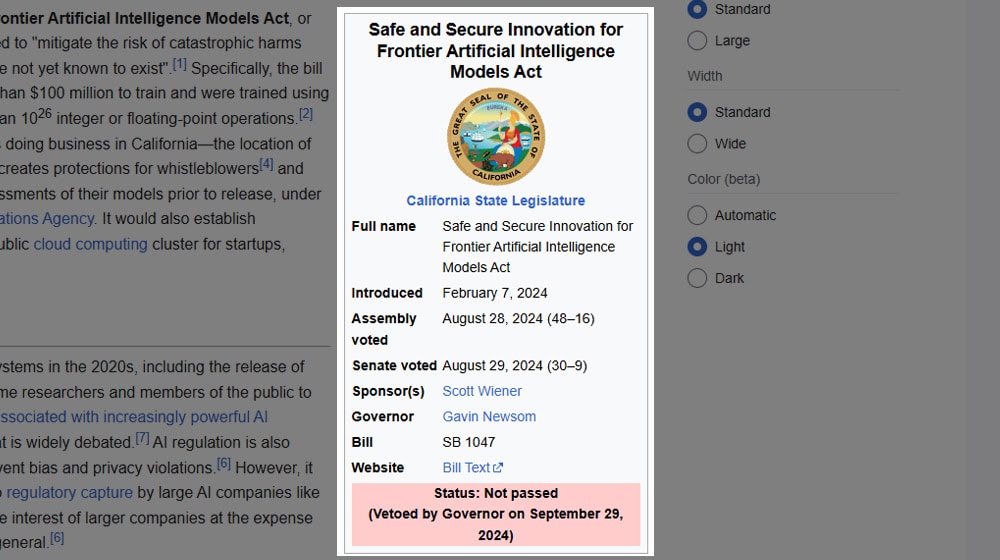
The concept and goal of SB 1047 was to create a large and comprehensive AI regulation framework, meant to prevent things like runaway AI development, giving AI too much power, letting it preside unsupervised over areas where it could cause critical harm, and so on. Basically, "AI has a lot of potential to be very dangerous so we need to establish a framework to regulate it ASAP and head off the danger at the pass."
Broadly, the bill has a lot of support, and while the governor vetoed it, there's an expectation that the legislature will push it through anyway. The governor's objections are actually not against the content of the bill itself but rather how it targets AI for regulation. SB 1047 enforces regulations on AI models based on their computational size, which sounds good at a glance but leaves "smaller" AIs free to fly under the radar, even if they operate in high-risk areas.
In any case, for now, just know that a larger and more comprehensive framework for regulating AI in general was vetoed and, while it might be passed later, has not yet been pushed through.
California's 18 AI Bills
Now, let's talk about the 18 bills that were passed as part of California's recent push to regulate AI. For the most part, these are all much, much more narrow than SB 1047 and aim at restricting, outlawing, or closing loopholes in existing laws that crop up because of what AI is and how it works. You'll see what I mean as we go through it.
AB 2602: Contracts against public policy: personal or professional services: digital replicas.
AB 2602 is a bill developed in reaction to exploitation from large media companies. Basically, as soon as AI was able to generate a workable replica of an existing human being, places like Hollywood immediately saw a way to record actors, voice actors, and other talent and then use those replicas without needing to pay the people for the work.
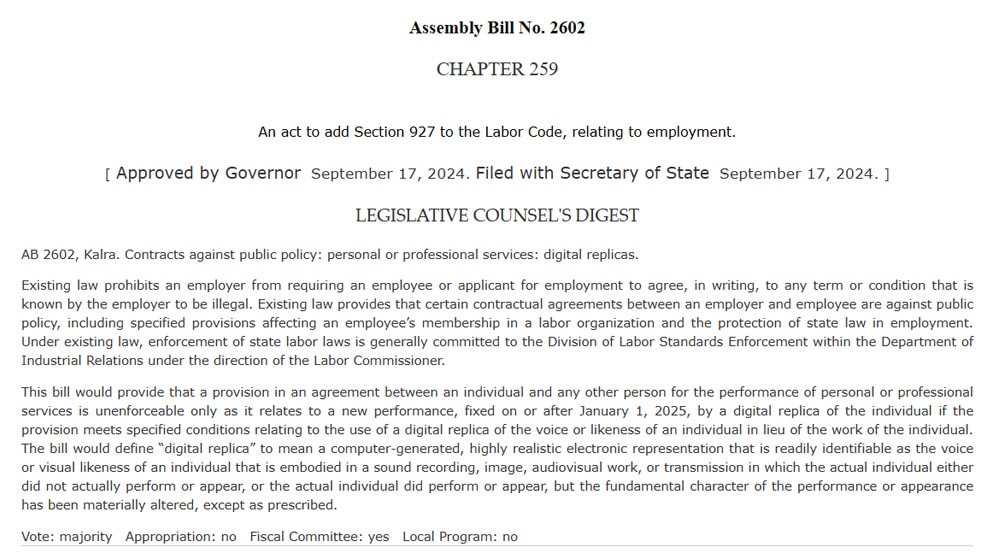
AB 2602 requires that companies seeking to do that kind of thing have to make it clear what they plan to do with a person's likeness – rather than just a generic "maintain the likeness for future use" clause – and requires that the actor in question be represented by legal counsel or a labor union, so a less sophisticated individual isn't taken advantage of because of tricky contract language.
This one is a win for SAG-AFTRA, in particular, to avoid exploitation and a collapse of acting, voice acting, and screenwriting.
AB 1836: Use of likeness: digital replica.
AB 1836 is a fairly simple bill that simply prohibits unauthorized commercial use of a deceased person's digital replica.
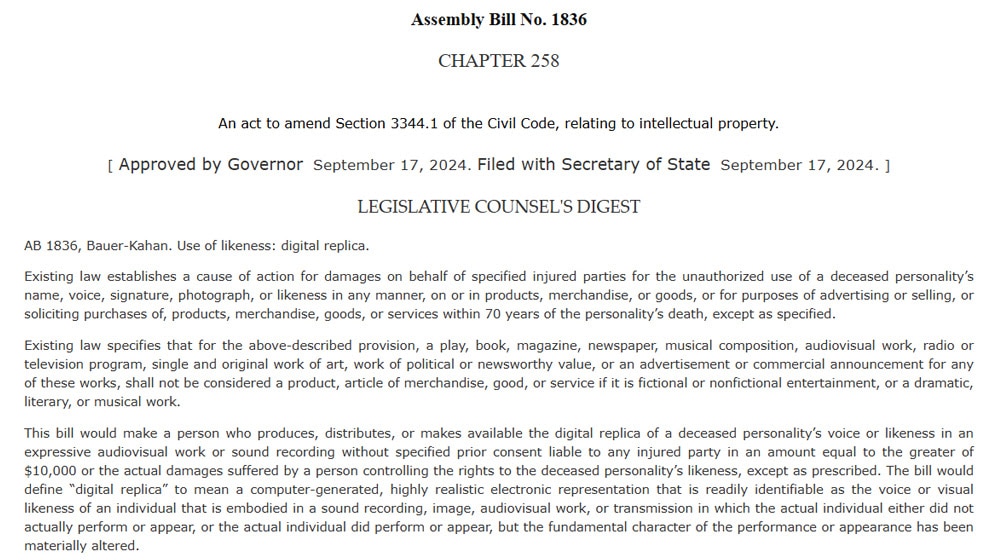
The concept of "digital graverobbing" by training an AI on a deceased actor to have them continue to "star" in films was made illegal and punishable by a minimum of either $10,000 or the actual damages suffered by the breach. Simple, narrow, and easy to grasp.
AB 2013: Generative artificial intelligence: training data transparency.
A simple bill that could have a very large impact, this bill requires that AI developers disclose information about their training data, including a high-level summary of the data used in the training data set (so they can't bamboozle you by providing obfuscated lists).
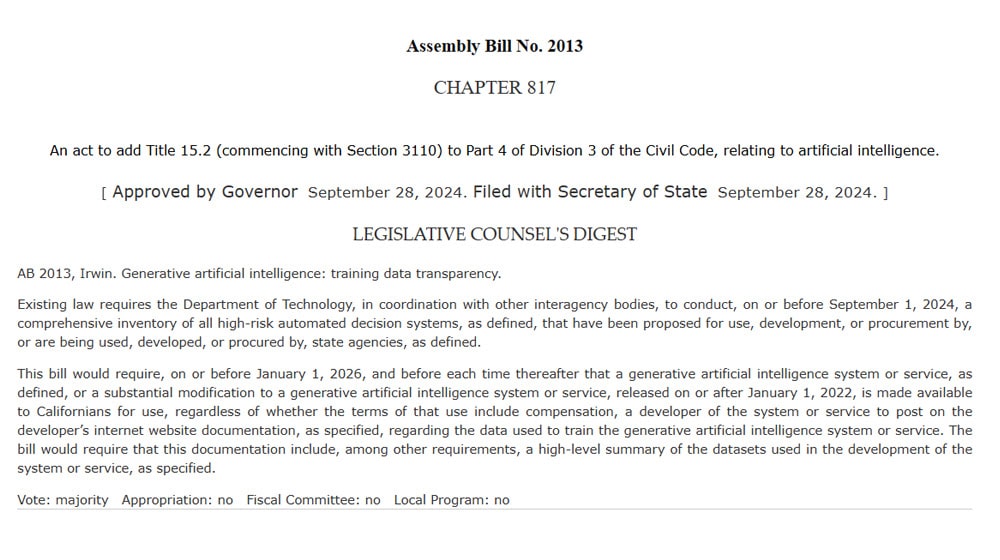
The only reason this bill hasn't caused a massive shakeup yet is that the deadline to publish that disclosure is January 1, 2026, so you can bet most of these AI developers will wait until December 31, 2025, to publish it.
SB 942: California AI Transparency Act.
This is also a bill with potentially far-reaching consequences. It requires that the major AI developers create – and critically, make freely available – a system to detect the products of their AI generation. It also requires them to include some form of watermark on content generated by the AIs. These requirements are also trickle-down to third-party licensees using the tools.
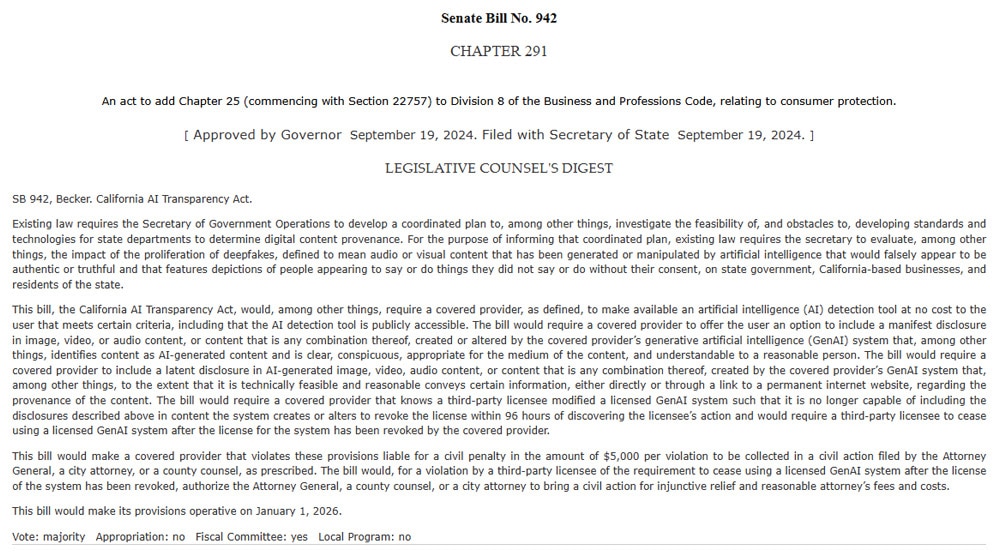
Since AI is already being used for massive amounts of disinformation in every conceivable sphere of information, having a reliable way produced by first-party engineers rather than third-party reverse-engineers is going to be very important moving forward.
Like AB 2013, the main reason we haven't seen this make waves yet is that the deadline for producing and releasing those tools and watermarks is January 1, 2026.
SB 896: Generative Artificial Intelligence Accountability Act.
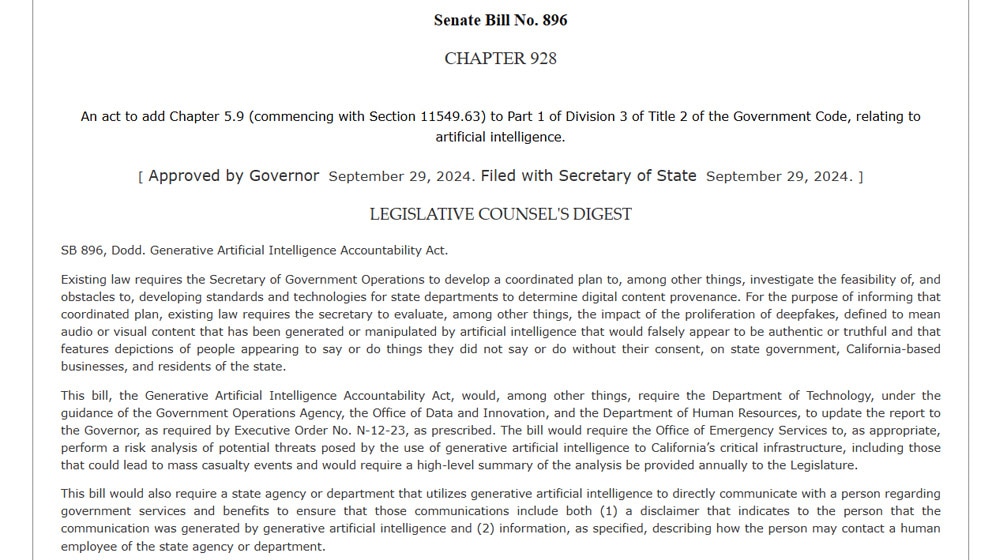
Despite the general name, this SB is rather simple; it requires specific governmental agencies and groups to produce a report on the benefits and risks of generative AI tools, and more importantly, it requires disclosure when generative AI is used in state-created customer interfaces or phone systems.
AB 1008: California Consumer Privacy Act of 2018: personal information.
This is an amendment to an older assembly bill, the CCPA. The CCPA already protects citizens' personal information such as documents, printed images, texts, audio and video files, and so on; this amendment adds AI likenesses and neural data to the list. It also specifies that the output of AI systems is also regulated.
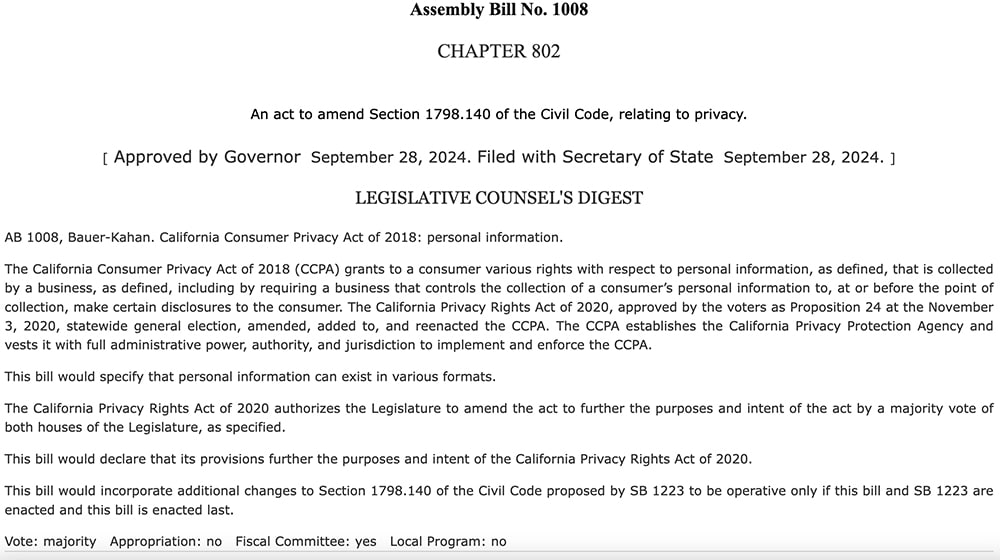
This essentially just closes a loophole where bad actors could potentially have used AI to steal personal information and blame it on the AI not being regulated the way other software or information sources are.
AB 2876: Pupil instruction: media literacy: artificial intelligence literacy: curriculum frameworks: instructional materials.
This bill is, in a sense, basically nothing. Basically, it just requires the California Instructional Quality Commission to consider adding media literacy, AI literacy, and similar information into the overall educational curriculum.

It doesn't require AI literacy to be added; it just requires that the commission take a look. Why this needs a whole bill, I have no idea, but there you go.
We create blog content that converts - not just for ourselves, but for our clients, too.
We pick blog topics like hedge funds pick stocks. Then, we create articles that are 10x better to earn the top spot.
Content marketing has two ingredients - content and marketing. We've earned our black belts in both.
SB 1288: Public schools: artificial intelligence working group.
This is similar to AB 2876 above; it requires the state Superintendent of Public Instruction to convene a working group to evaluate what, if anything, needs to be specified, added, removed, or changed to ensure that any use of AI within the school system cannot negatively impact pupils or instructors.
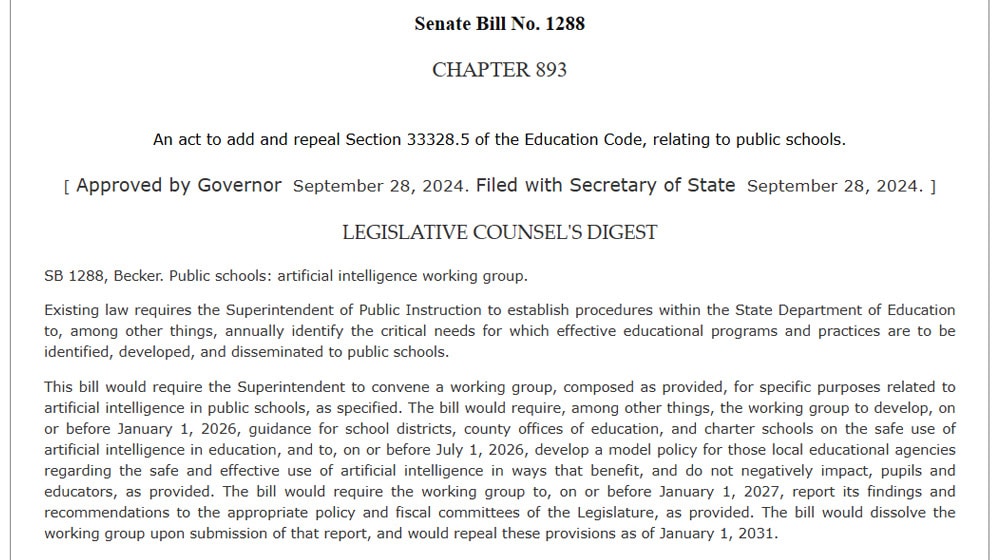
This has an even longer deadline than previous bills, requiring the group to report by January 1, 2027. It also self-repeals in 2031, I suppose under the assumption that the landscape will have changed significantly by then and legislation that supersedes it will be implemented.
AB 3030: Health care services: artificial intelligence.
This is another simple one focused on disclosure: it requires that healthcare professionals disclose when they're using a generative AI tool to communicate with patients.
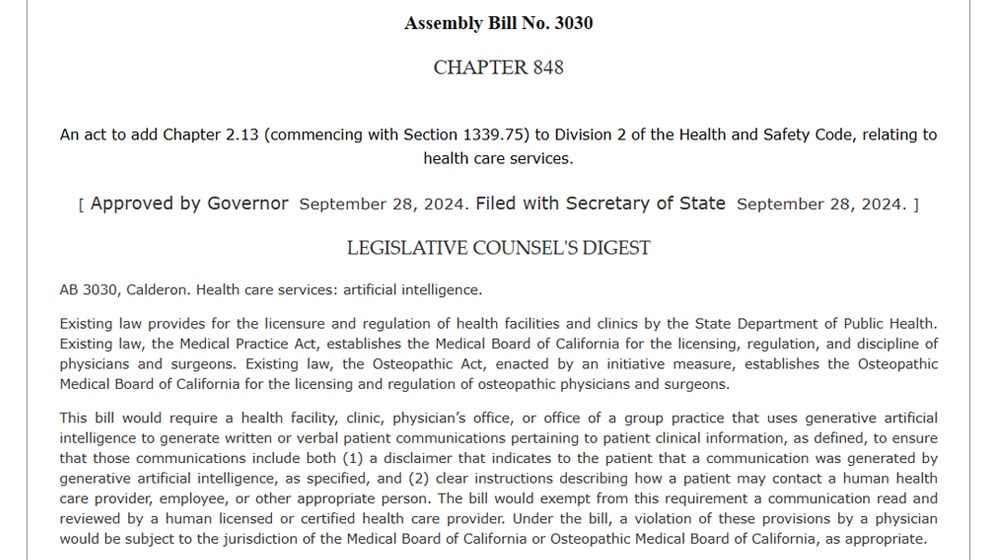
It doesn't prohibit doing so; it just ensures that patients are aware of it when it's happening.
SB 1120: Health care coverage: utilization review.
This is an amendment to an existing SB focused on health insurance providers. It requires that any insurance providers that want to use AI to make decisions about services or claims must use a licensed physician to supervise the use of those tools.
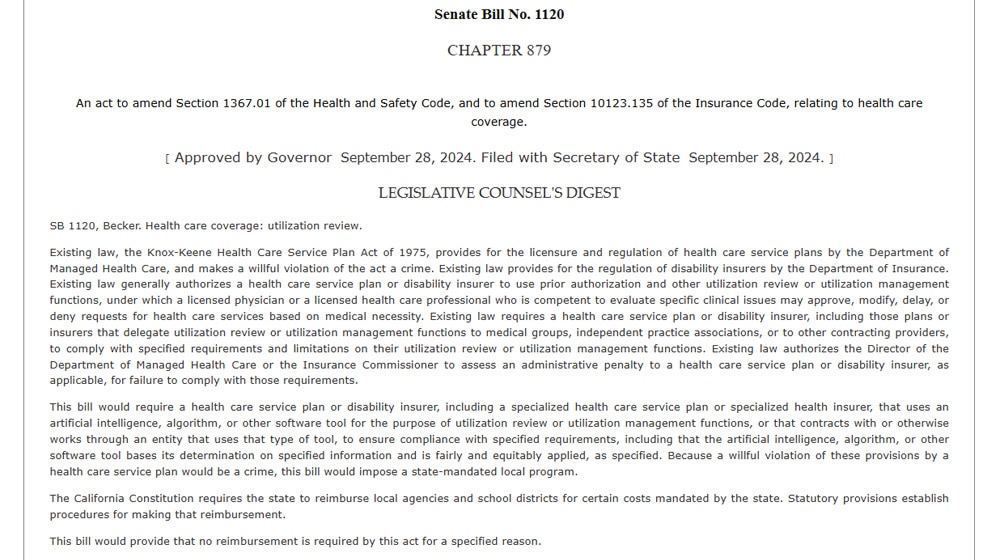
The idea that someone could ask ChatGPT if you really need your medication and could deny your insurance claim if it said no is insane but very much a reality in the insurance industry, so this is a good step (though short of where it should be, which is prohibiting the insurance providers from denying claims entirely using general AI to make decisions.
AB 2905: Telecommunications: automatic dialing-announcing devices: artificial voices.
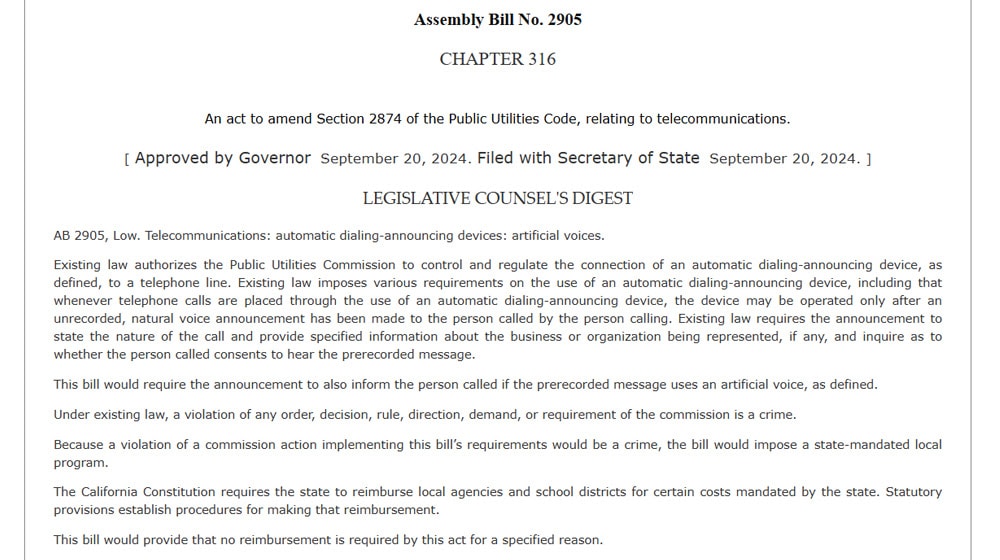
Another simple one, this one requires disclosure if AI is used in robocalls.
AB 2885: Artificial intelligence.
In order to prevent a million lawyers from filing cases starting with "what really is AI?", this bill defines what "artificial intelligence" means.
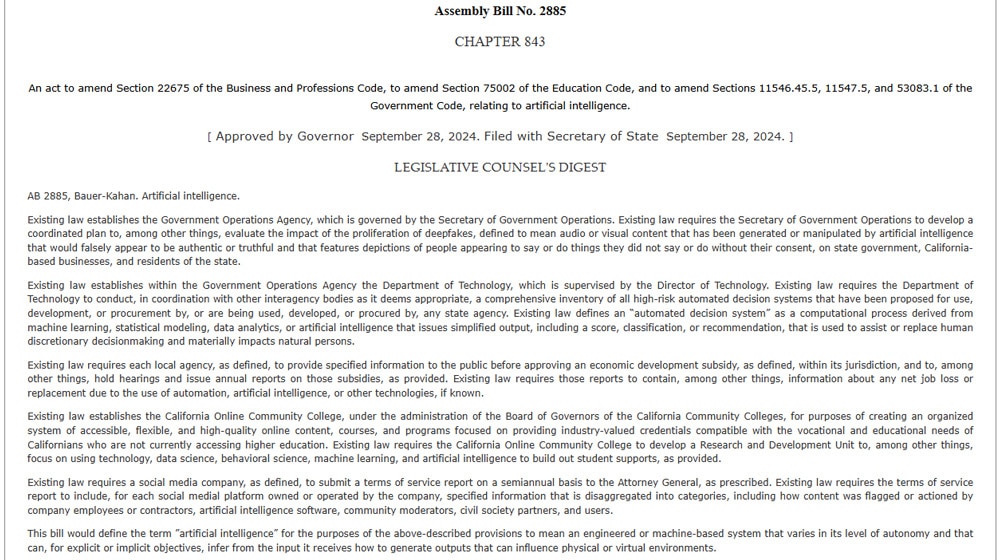
Their definition, for now, is:
"…an engineered or machine-based system that varies in its level of autonomy and that can, for explicit or implicit objectives, infer from the input it receives how to generate outputs that can influence physical or virtual environments."
I wouldn't be surprised if this gets amended over time as systems change.
AB 1831: Crimes: child pornography.
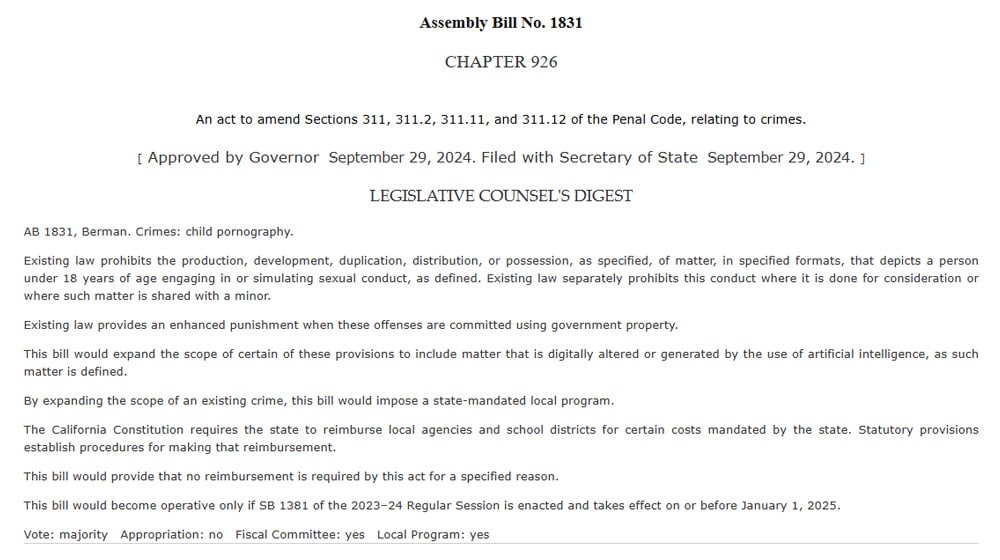
Not something I want to discuss in depth on this site, but: this bill prohibits the use of AI to create child porn. Duh.
SB 926: Crimes: distribution of intimate images.
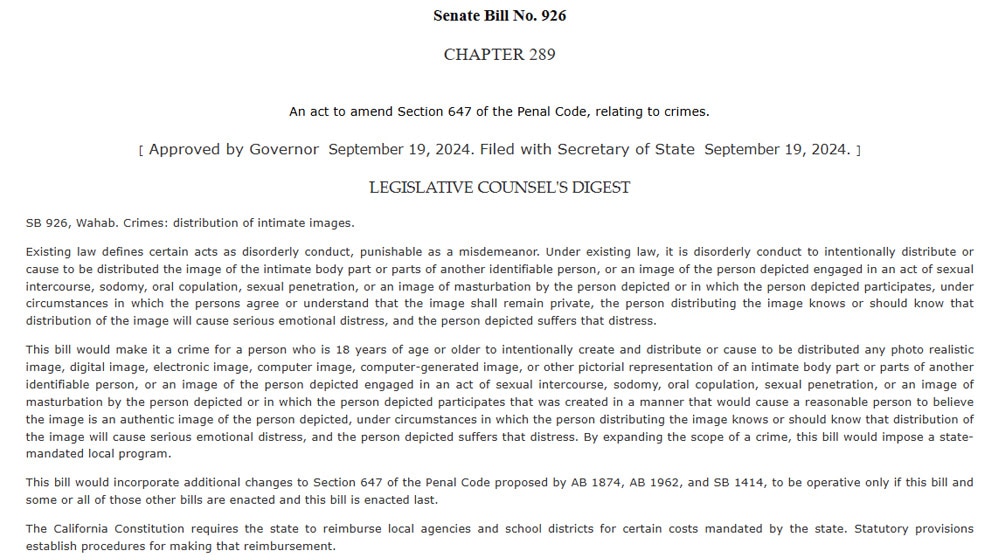
This makes it a crime to create and distribute "deepfake" or AI-generated pornography of real people.
SB 981: Sexually explicit digital images.
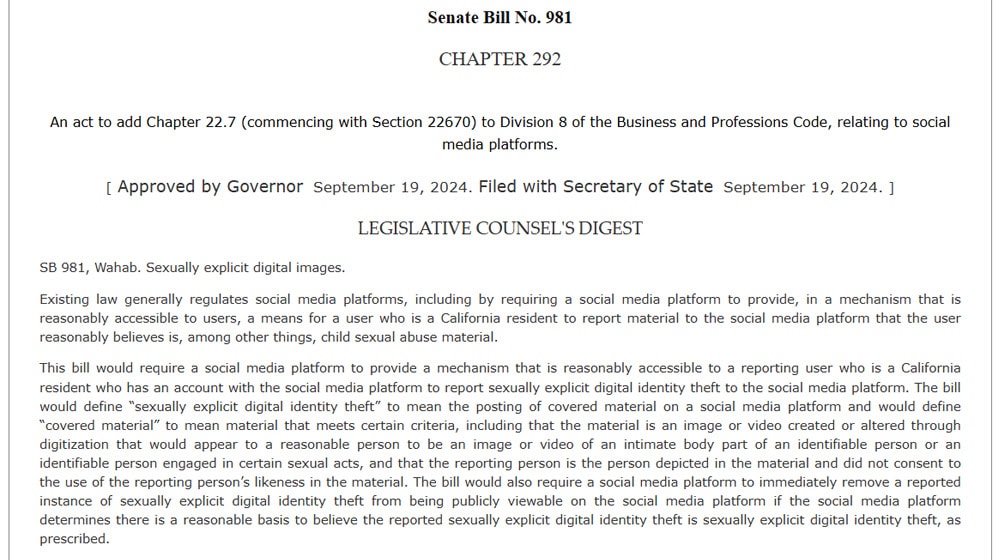
Tying in with the previous, this requires that social networks provide a way for users to report "deepfake" or AI-generated pornography and requires that they immediately remove reported content.
AB 2655: Defending Democracy from Deepfake Deception Act of 2024.
An ambitious act, this one requires that large online platforms – not just social media – block posting election disinformation during a date range before and after elections, label AI and Deepfake content as inauthentic/fake/false, and create a reporting platform for such content. It does carve out an exception for satire and parody and certain specified broadcasting stations, newspapers, and periodicals.
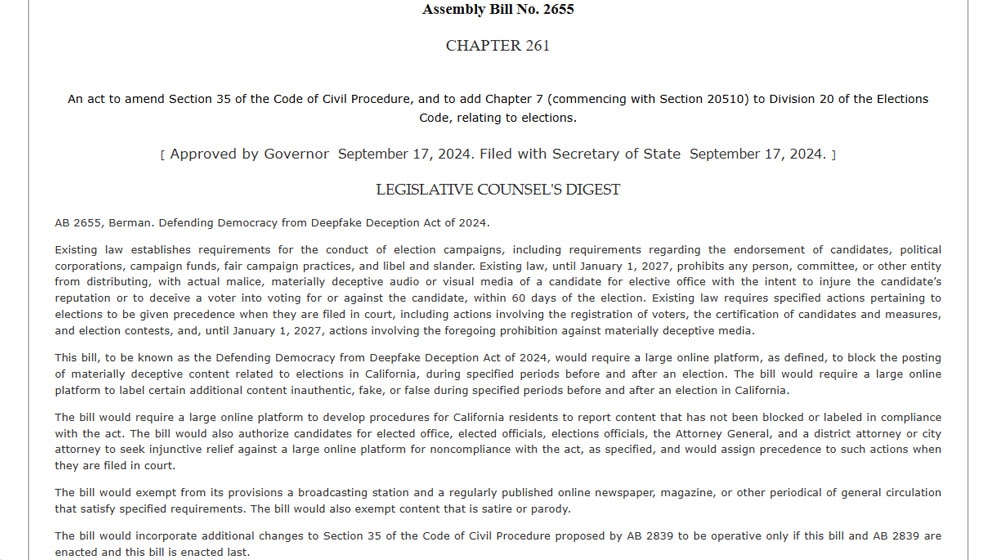
This is probably the largest and most detailed of the bills on the whole list, but fortunately, it's not terribly relevant to my readers unless you're an election blog or something.
AB 2839: Elections: deceptive media in advertisements.
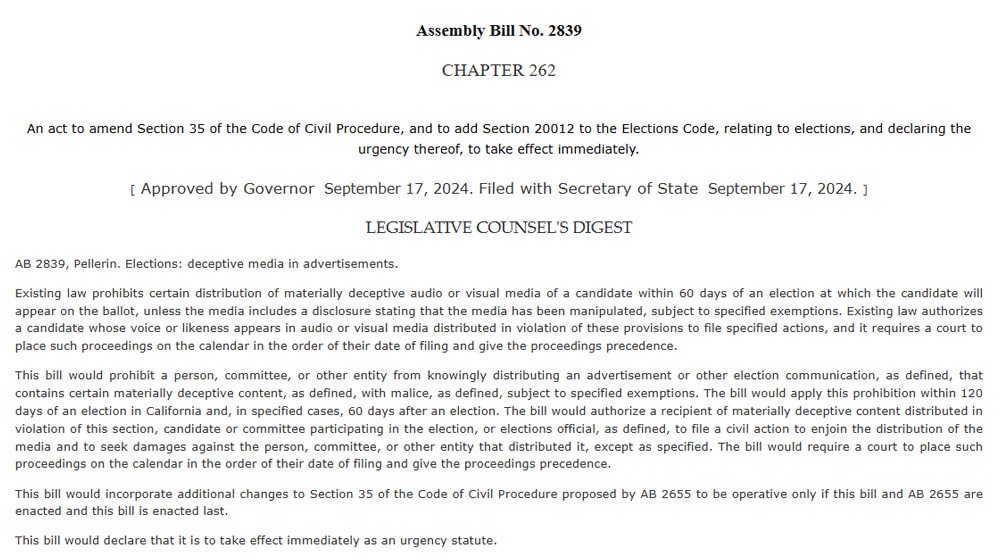
A simple one piggybacking on the previous one, that prohibits malicious distribution of campaign advertisements and election-related communications with deceptive content.
AB 2355: Political Reform Act of 1974: political advertisements: artificial intelligence.
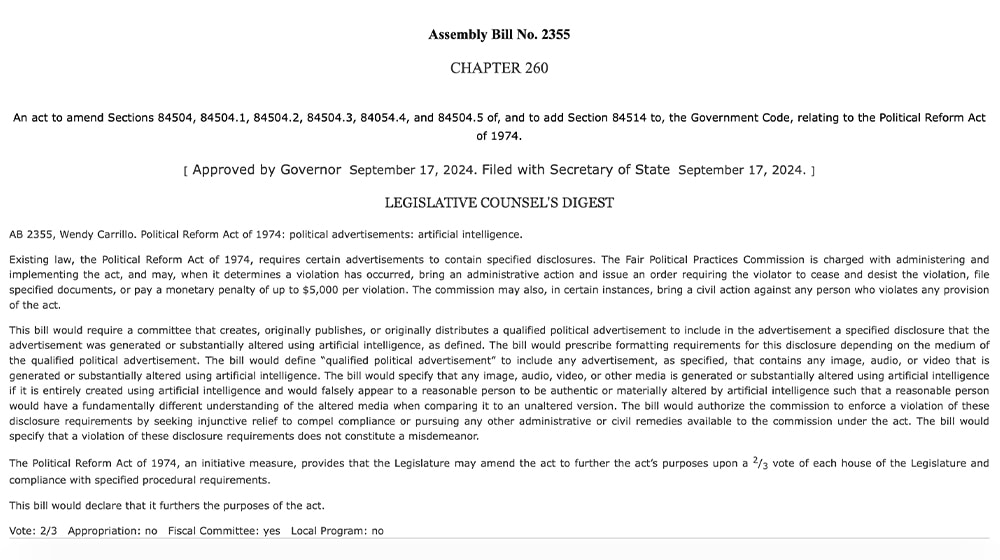
Another disclosure bill, this one requires that any election-related or campaign advertisements disclose if they use AI to create anything in them, in whole or in part.
What California's Bills Mean for Blogs and AI Content
So, there's your rundown. Pop quiz: does any of that affect a business blog?
For the most part, no. At least, not right away. If you're not an election platform, an adult content platform, a robo-dialer, a school, a health insurance provider, or any of the other relatively narrow niches called out specifically, you don't hugely have to worry about these bills.
Nothing in California's bills, for now, prohibits the use of generative AI content in blogs. That said, there are two potential repercussions to keep in mind.
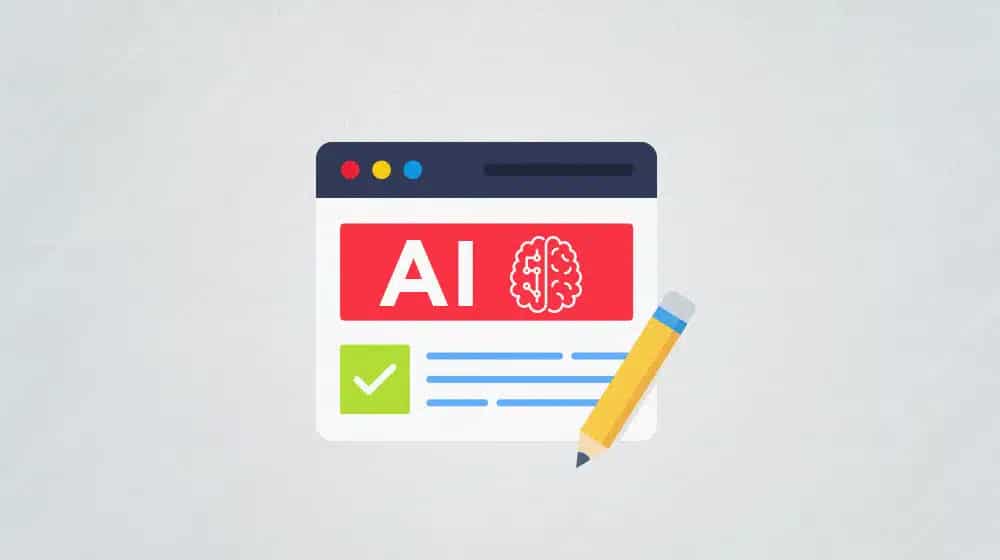
First, AI will increasingly require disclosure. For now, standard business blogs don't need to worry about it, but in the future, you can probably assume that you'll need to disclose if your blog posts, images, videos, or advertisements use AI.
Second, once AI detection and watermarking come into play, you'll be "vulnerable" to anyone who wants to make a plugin or tool to flag sites that use AI. If you're worried about a reputational hit from being flagged as an AI-using business, well, that's something you'll need to work out.
For now, though, it's not illegal to use AI-generated content on a blog, barring a few obvious exceptions where your goal for doing so is to commit a crime. Obviously, don't do that, and you'll be fine.



 30 Second Summary
30 Second Summary

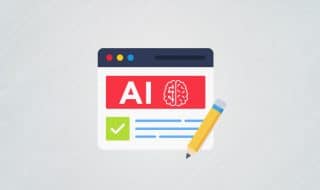
Comments